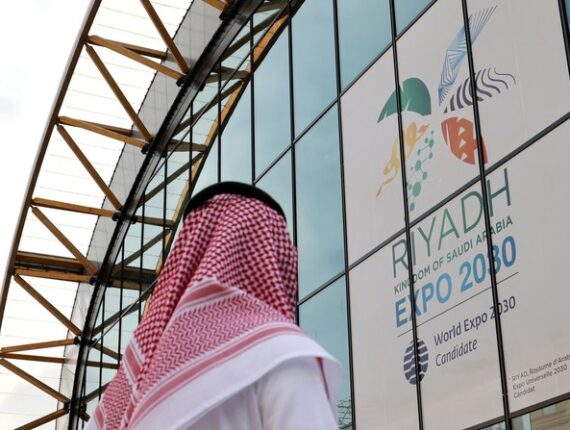Arab News
By: Rabbi Marc Schneier
February 18, 2024

Saudi Arabia has invested in purchasing teams around the world across a wide range of sports, from football to golf. (Arab News File)
Professional sports attract enormous viewing audiences in countries around the world. They have the power to inspire collaboration and friendship between athletes of diverse races, religions and nationalities, who then inspire the building of friendships and understanding between fans of divergent backgrounds.
No country has understood this more than Saudi Arabia. In recent years, the Kingdom has invested heavily in purchasing and promoting teams and tournaments around the world across a wide range of sports, from soccer to golf. In the process, Saudi Arabia has established its brand widely, highlighting the impressive social changes taking place thanks to the enlightened leadership of King Salman and Crown Prince Mohammed bin Salman.
Internally, the Kingdom has promoted sport as part of a broader strategy to constructively reshape the nation’s culture and social fabric. In 2018, shortly after women were first allowed to drive in the Kingdom, Reema Juffali made history by becoming its first female professional racing driver and quickly became a role model for others around the world. Juffali’s success, promoted internationally on social media, is an outstanding example of how to use sports luminaries to ease popular resistance to social and cultural change — in this case, promoting gender equality that enables Saudi women to fulfill their talents and realize their dreams in diverse fields.
In the US, we recently saw an uplifting example of how a premiere sporting event was used as an opportunity to counter escalating hatred and bigotry against minority faith and ethnic communities. Robert Kraft, chairperson of the New England Patriots, an American football team, spent $7 million to produce a powerful 30-second commercial against hate. It was shown on Feb. 11 during the Super Bowl, which this year drew 123 million viewers, the largest television audience in the US since the moon landing back in 1969. Given that Kraft, one of America’s most prominent Jewish leaders, has served since 2019 as chairperson of the Robert Kraft Foundation to Combat Antisemitism, media insiders expected the slickly produced ad would focus exclusively on encouraging viewers to combat hatred of Jews. Yet, unexpectedly, the commercial not only addressed antisemitism, but also Islamophobia and racial animus toward African Americans.
“Muslims and Jews need to stand up for each other when either community is under attack.”
Rabbi Marc Schneier
The ad, titled “Silence,” opens with Dr. Clarence B. Jones, one-time speechwriter and adviser to Dr. Martin Luther King Jr., the martyred icon of America’s civil rights movement, intoning: “All hate thrives on one thing — silence.” After rapid-fire images of the Ku Klux Klan burning a cross, a flaming swastika, a hashtag proclaiming #HitlerWasRight, and then a moving counter-image of a Jewish man wearing a yarmulke (head covering) and a Muslim woman in a hijab painting over graffiti proclaiming “No Muslims,” Jones says: “The people who will change the nation are those that speak out, who refuse to be bystanders and raise their voices against injustice. When we stand up to silence, we stand up to all hate.” The slogan “Stand up to Jewish hate” then flashes across the screen, quickly followed by another proclaiming “Stand up to all hate.”
Indeed, hate crimes and assorted acts of bigotry against both Jews and Muslims have skyrocketed since the eruption of the Israel-Hamas war last October. Recent figures released by the Anti-Defamation League, the most prominent American Jewish defense agency, show a total of 3,283 antisemitic incidents between Oct. 7, 2023, and Jan. 7, 2024; a 361 percent increase over the same period during the previous year, when the ADL reported 712 incidents. For its part, in early December, leading American Muslim organizations reported that 2,171 Islamophobia-related incidents or complaints of bias were received, a figure for a period of two months that is almost 50 percent of the total number recorded during the whole of 2022.
The unprecedented rise of antisemitism and Islamophobia led the White House to unveil a plan to combat antisemitism on college campuses, with the departments of Justice and Homeland Security partnering with campus law enforcement to track hate-related threats and provide federal resources to schools. It also announced the development of the first US National Strategy to Counter Islamophobia.
Kraft’s commercial is noteworthy in uniting the moral imperative to fight anti-Jewish hatred with hatred of Muslims, Black people, and other minority communities. The ad buttresses a message I have made repeatedly in my work to strengthen Muslim-Jewish relations over the past 20 years — namely that Muslims and Jews need to stand up for each other when either community is under attack or show solidarity with other communities when they are unfairly victimized. Our common destiny must strengthen our bonds of concerns, compassion and caring for each other.
—
- Rabbi Marc Schneier is president of the Foundation for Ethnic Understanding. He is the co-author, with Imam Shamsi Ali, of “Sons of Abraham: A Candid Conversation About the Issues that Divide and Unite Muslims and Jews.”





